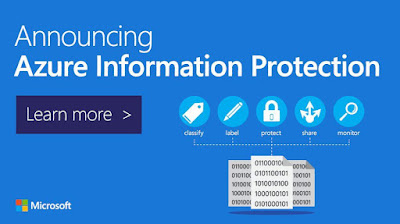What is Azure Information Protection?
For
creating and protecting the files and emails of any company, a cloud-based the platform is introduced by Microsoft named, Azure DevOps Information Protection
(AIP). By using AIP, we can create and protect the files and
emails by using our own labels.
Labels can be implemented by admins who specify the conditions and rules, manually by clients or together where clients are given suggestions.
In Azure online training Information Protection, the admin has to form a label with rules that finds sensitive data. If a client stores a word file, that has a credit card information, then they can see a custom tooltip that suggests the label that the admin has formed.
Labels can be implemented by admins who specify the conditions and rules, manually by clients or together where clients are given suggestions.
In Azure online training Information Protection, the admin has to form a label with rules that finds sensitive data. If a client stores a word file, that has a credit card information, then they can see a custom tooltip that suggests the label that the admin has formed.
This
label separates the file and protects it. When the content is classified, then
we record and manage its usage. We can examine data flows, to get better
insights into our business, find unsafe actions and take the right actions,
track paths to files, avoid data leakage or misuse and more.
Classification
by applying labels:
Documents
and emails can be classified, by using AIP labels. Due to this, we can easily
identify the location of the data, and also who can access the data. The labels
consist of visual indications like a footer, header, watermark, etc.
A
data is attached to the email headers, and files in an understandable text.
This text makes sure that other services like loss prevention technologies, can
find the category and take proper action.
For
instance, the email message can be categorized as “General”. In the label, a
footer is attached as “Sensitivity: General” to the email message. By seeing
this footer, all the receivers understand that it is general business
information and they should not send this, out of the company.
The label is included in the header of the email, which makes email service to inspect
this value, and prevents it from sending outside the company
Data Security in AIP:
Azure
Rights Management (Azure RMS) is used, by the protection technology. This is
combined with other Microsoft cloud applications and services, like Azure
active directory and office 365.
This
technology can also be used with your own business applications, and
information safety solutions from software dealers, even though they are in the
cloud or on-premises.
AIP
makes use of identity, encryption and authorization strategies. The
applied protection is also applied to the labels and with the emails and files,
regardless of the location by using RMS.
Even
though the data is shared with other people, the information protection
solution makes us control our data.
For
instance, by using AIP we can create a report file or sales prediction sheet so
that it can only be accessed, by people of our company, and manages if the file
can be edited or restricted to read-only, or avoid it from being copied.
Similarly,
we can also compose emails and protect them from forwarding and avoid the reply
to all choice usage. While creating a label, we can use these protection settings, which makes users categorize and protect files and emails with the help of a label.
The
services and applications that do not support labeling, but support protection,
can also apply the protection settings. For such services and applications, the
protection settings are available in the form of Rights Management Templates.
What
are Azure Rights Management Templates?
When
you activate the Azure online training India RMS, by default two templates are available for you
which limits the data access, to users in our company. By using these
templates, we can directly prevent data loss from our company.
We
can apply our own protection settings in addition to the default templates,
that limits the controls. If we create a label for AIP which consists of
protection settings, below covers, this action makes a relevant Azure RMS
template.
We
can also use that template with services, and applications that favor Azure
RMS. For instance, we can form the Exchange Online mail flow protocols, in the
Exchange admin center for using these templates.
Therefore,
AIP helps in creating and maintaining the security of the files and emails of
the company.
In this article, I have explained the AIP technology. I will explain how to
integrate with end-user workflows for emails and documents in Azure information in my next
article.

Thanks for sharing this wonderful content.its very useful to us.
ReplyDeleteI gained many unknown information, the way you have clearly explained is really fantastic. I hope you will continue to have similar posts to share with everyone! I believe a lot of people will be surprised to read this article!
Full Stack Training in Chennai | Certification | Online Training Course
Full Stack Training in Bangalore | Certification | Online Training Course
Full Stack Training in Hyderabad | Certification | Online Training Course
Full Stack Developer Training in Chennai | Mean Stack Developer Training in Chennai
Full Stack Training
Full Stack Online Training
I like this post because it contains a lot of useful information to read about azure protection. maybe everyone will like me. I hope this post of yours will be more appreciated by it really excellent, i enjoyed it, thanks for posting it.
ReplyDeleteDevOps Training in Chennai
DevOps Online Training in Chennai
DevOps Training in Bangalore
DevOps Training in Hyderabad
DevOps Training in Coimbatore
DevOps Training
DevOps Online Training
Great Article.Thanks for sharing.
ReplyDeletealso,check DevOps training in Pune